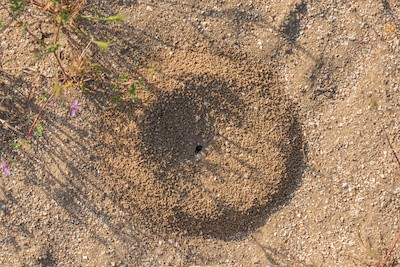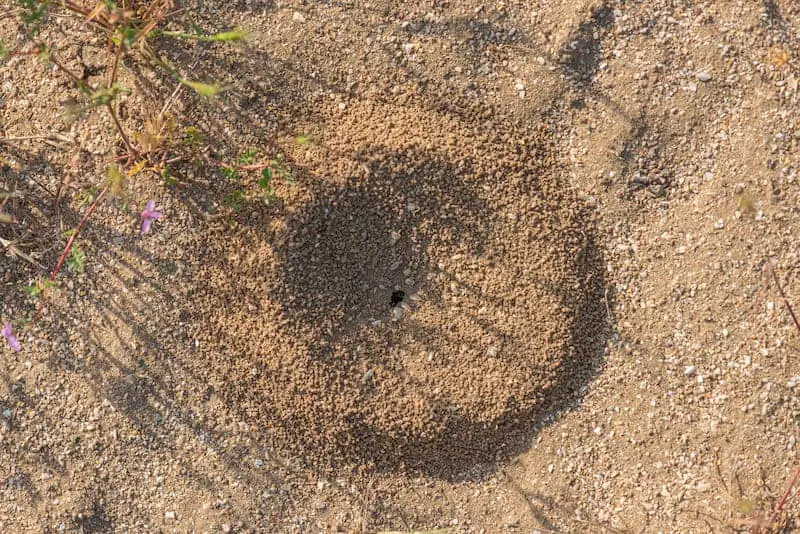The Best Way to Rid Your Yard of Ant Hills
Though the critters are mostly harmless, ants and their colonies in and near your home can be a real nuisance. Due to the nature of how they live, there can be hundreds, or even thousands, per colony. There are a variety of ways to attack the nest and get rid of the ants, with each having its own pros and cons, and we are happy to share some tips and tricks for getting rid of those annoying guests!
So, how do you get rid of ant hills? There are several ways to get rid of ant hills including drowning with water, using a solution of vinegar and water, or using a chemical pesticide solution. Regardless of the approach you take, it is important to first open the next or colony using a rake to ensure the substance reaches the ants.
Note: these tips are effective for most common types of ants outdoors, but if you have a different issue, such as carpenter ants, which can cause structural damage to your house, you will need to utilize a different set of treatments. Keep reading to learn more about riding your yard of ant hills!

How Do I Destroy the Nest & Get Rid of the Ants?
The most important thing to understand about ants is that they live in a nest (also called a colony). The only way to get rid of them is to destroy the nest completely. There are a variety of ways to destroy the nest, though some of the more effective options can also damage the grass and vegetation around your home if they are not properly utilized.
The first thing you will want to do, no matter your chosen method of attack, is to rake open the nest. This is an important step, as ant colonies can go deep into the ground. You will need to ensure that you get the treatment to penetrate the entire colony. After you’ve opened the nest, it’s time to treat the area with your chosen extermination treatment!
Drown the Ants
One option is to drown the ants with water. This is the least invasive to your yard, but it is also the least effective treatment option. Ants can live in water for up to 24 hours.
It will be necessary to retreat the area a few times over the next 24 hours to ensure that you have thoroughly drowned them.
To accomplish this, just turn on your outdoor water source and pour water into the next until it is completely saturated (approx. 15 minutes to half an hour).
If you are looking for a more effective solution, and willing to take some risk with your yard, you can try pouring boiling water into the colony. The boiling water will sear the ants, and you can even add dish soap for extra potency! This option does have some risk, though, as it can burn the grass and vegetation nearby, so you will want to ensure that you understand the risks and use caution beforehand with this option.
Vinegar & Water Solution
Likewise, you can also try using a 50/50 mix of vinegar and water to kill the ants. You apply it in the same manner as the boiling water. This solution is very effective, but it can also damage your lawn, so be careful, and don’t forget to add the soap for extra potency!
How to Increase Treatment Effectiveness
One item not mentioned above as a treatment option is store-bought chemicals. The reason for this is that is although many chemicals are effective in killing ants, they are not necessarily effective at killing the queen. As a result, you could potentially see many smaller nests pop up after using these treatment options.
Killing the queen is necessary to defeating the colony and eliminating your ant problem. Thousands of ants live in a colony with one or more queen ants, and the colony will continue to exist until the queen dies. Killing the queen, or queens, is the ONLY way to eliminate the colony!
Even though you have treated the nest, and killed the queen, you may also want to treat the ant trails. It is also wise to put up a barrier around your home or business. Treating these areas can help to ensure that there are no surviving ants that may try to form another small colony elsewhere. It will also help to subdue other ant colonies that may currently be unseen or unknown. We will discuss these treatments in the paragraphs below.
Treating Ant Trails & Preventing New Colonies
It is important to treat the ant trails, as ants leave a scent trail for other ants (even ants from other colonies) to follow. Even if you successfully eliminate a colony of ants, more ants could find their way to the same paths and begin to cause similar problems for you. There are a few steps you can take to treat those trails and prevent reinfestation.
Interestingly, the vinegar and water that you may have used to kill the nest will not be effective for treating trails. It is only effective when making contact directly with the ants. Once it absorbs (which it will, if on a trail), it loses its effect.
Ant trails are the trails where you can see ants following each other one after another, either to or from a nest. You can start by treating the trails with a chemical known as diatomaceous earth, or DE. You can buy this at any store where pesticides or lawn care items are sold.
Although this treatment works well for killing ants, it only kills the ants that come into physical contact with the product. Any ants that do not come into contact with the product, and that aren’t destroyed by nest treatment will remain alive, deeming further treatment to be necessary.
You can use DE to set up a perimeter around your home and property. Just sprinkle it along the area where you want to create the perimeter. You can also set up some bait traps along the trail, which we will talk about below!
How to Set Bait Traps for Ants
Aside from the DE along the trail, you can also set up some sweet bait traps. These are very effective, as ants love sugar. There are a few ways that you can do this, each of which is highly effective!
• Baking soda mixed with powdered sugar – make a 50/50 mixture of baking soda and powdered sugar. Ants will eat this mixture, and the baking soda will cause an acidic reaction within their stomachs, causing them to die. They will also take this mixture back to their nest to share, which will also help somewhat with nest infestation.
• Borax mixed with corn syrup – Borax is deadly to ants. Mix it with corn syrup (ants love the sweet liquid) and place it on a paper surface, such as an index card, and the ants will eat it and die. Unlike the baking soda mixture, the ants will not carry this back to their nest.
• Store-bought bait – store-bought bait can be effective, and is great when you have concerns about small children potentially being near the infestation. Use as directed.
In addition to these effective bait treatments, you may also want to keep a spray bottle of a castile soap mix handy. You can mix ¼ cup of castile soap with a quart of water and spray it on any stray ants you may see. This product won’t make it back to the nest, but it will kill ants on contact when you spray them with it.
Maintaining Your Ant-Free Home & Yard
Congratulations! You have now defeated the ants, starting at the nest, and including all of their feeding grounds. Change out your bait traps frequently, and continue to treat the trails and areas around your home throughout the summer to help keep ant infestations from reoccurring. If all else fails, you can hire an expert to come and treat your property and to share even more tips and tricks about treating and preventing ant (and other insects) infestations.

